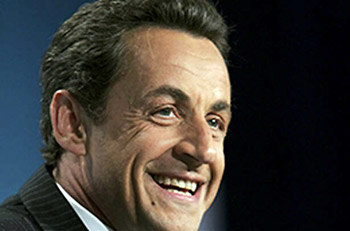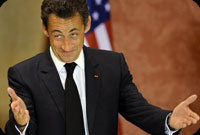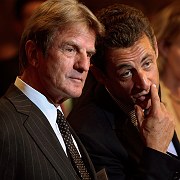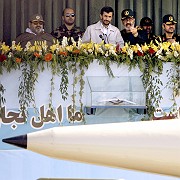http://www.ajn.com.au/news/news.asp?pgID=3162
INTERNATIONAL (may 8, 2007)
Sarkozy's
Jewish
roots

Photo:
JTA
France's new president, Nicolas Sarkozy, lost 57 members of
his family to the Nazis and comes from a long line of Jewish
and Zionist leaders and heroes, writes RAANAN ELIAZ.
IN an interview Nicolas Sarkozy gave in 2004, he expressed
an extraordinary understanding of the plight of the Jewish
people for a home: "Should I remind you the visceral attachment of
every Jew to Israel, as a second mother homeland? There is nothing
outrageous about it. Every Jew carries within him a fear passed down
through generations, and he knows that if one day he will not feel
safe in his country, there will always be a place that would welcome
him. And this is Israel."
Sarkozy's sympathy and understanding is most probably a
product of his upbringing it is well known that
Sarkozy's mother was born to the Mallah family, one of
the oldest Jewish families of Salonika, Greece.
Additionally, many may be surprised to learn that his
yet-to-be-revealed family history involves a true and
fascinating story of leadership, heroism and survival.
It remains to be seen whether his personal history will
affect his foreign policy and France's role in the
Middle East conflict.
In the 15th century, the Mallah family (in Hebrew: messenger
or angel) escaped the Spanish Inquisition to Provence,
France and moved about one hundred years later to
Salonika.
In Greece, several family members became prominent Zionist
leaders, active in the local and national political,
economic, social and cultural life.
To this day many Mallahs are still active Zionists around
the world.
Sarkozy's grandfather, Aron Mallah, nicknamed Benkio,
was born in 1890.
Beniko's uncle Moshe was a well-known Rabbi and a
devoted Zionist who, in 1898 published and edited "El
Avenir", the leading paper of the Zionist national
movement in Greece at the time.
His cousin, Asher, was a Senator in the Greek Senate and in
1912 he helped guarantee the establishment of the Technion
– the elite technological university in Haifa,
Israel.
In 1919 he was elected as the first President of the Zionist
Federation of Greece and he headed the Zionist Council for
several years. In the 1930's he helped Jews flee to
Israel, to which he himself immigrated in 1934.
Another of Beniko's cousins, Peppo Mallah, was a
philanthropist for Jewish causes who served in the Greek
Parliament, and in 1920 he was offered, but declined, the
position of Greece's Minister of Finance. After the
establishment of the State of Israel he became the
country's first diplomatic envoy to Greece.
In 1917 a great fire destroyed parts of Salonika and damaged
the family estate.
Many Jewish-owned properties, including the Mallah's,
were expropriated by the Greek government. Jewish population
emigrated from Greece and much of the Mallah family left
Salonika to France, America and Israel.
Sarkozy's grandfather, Beniko, immigrated to France
with his mother. When in France Beniko converted to
Catholicism and changed his name to Benedict in order to
marry a French Christian girl named Adèle
Bouvier.
Adèle and Benedict had two daughters, Susanne and
Andrée. Although Benedict integrated fully into
French society, he remained close to his Jewish family,
origin and culture.
Knowing he was still considered Jewish by blood, during
World War II he and his family hid in Marcillac la Croisille
in the Corrèze region, western France.
During the Holocaust, many of the Mallahs who stayed in
Salonika or moved to France were deported to concentration
and extermination camps.
In total, fifty-seven family members were murdered by the
Nazis. Testimonies reveal that several revolted against the
Nazis and one, Buena Mallah, was the subject of Nazis
medical experiments in the Birkenau concentration camp.
In 1950 Benedict's daughter, Andrée Mallah,
married Pal Nagy Bosca y Sarkozy, a descendent of a
Hungarian aristocratic family. The couple had three sons
– Guillaume, Nicolas and François.
The marriage failed and they divorced in 1960, so
Andrée raised her three boys close to their
grandfather, Benedict.
Nicolas was especially close to Benedict, who was like a
father to him. In his biography Sarkozy tells he admired his
grandfather, and through hours spent of listening to his
stories of the Nazi occupation, the "Maquis"
(French resistance), De Gaulle and the D-day, Benedict
bequeathed to Nicolas his political convictions.
Sarkozy's family lived in Paris until Benedict's
death in 1972, at which point they moved to
Neuilly-sur-Seine to be closer to the boys' father, Pal
(who changed his name to Paul) Sarkozy. Various memoirs
accounted Paul as a father who did not spend much time with
the kids or help the family monetarily.
Nicolas had to sell flowers and ice cream in order to pay
for his studies. However, his fascination with politics led
him to become the city's youngest mayor and to rise to
the top of French and world politics. The rest is
history.
It may be a far leap to consider that Sarkozy's Jewish
ancestry may have any bearing on his policies
vis-à-vis Israel.
However, many expect Sarkozy's presidency to bring a
dramatic change not only in France's domestic affairs,
but also in the country's foreign policy in the
Middle-East.
One cannot overestimate the magnitude of the election of the
first French President born after World War II, whose
politics seem to represent a new dynamic after decades of
old-guard Chirac and Mitterrand.
There is even a reason to believe that Sarkozy, often mocked
as "the American friend" and blamed for 'ultra-liberal' worldviews, will lean towards a
more Atlanticist policy.
Nevertheless, there are several reasons that any
expectations for a drastic change in the country's
Middle East policy, or foreign policy in general, should be
downplayed.
First, one must bear in mind that France's new
president will spend the lion's share of his time
dealing with domestic issues such as the country's
stagnated economy, its social cohesiveness and the rising
integration-related crime rate. When he finds time to deal
with foreign affairs, Sarkozy will have to devote most of
his energy to protecting France's standing in an
ever-involved European Union.
In his dealings with the US, Sarkozy will most likely prefer
to engage on less explosive agenda-items than the
Middle-East.
Second, France's foreign policy stems from the
nation's interests, rooted in reality and influenced by
a range of historic, political, strategic and economic
considerations.
Since Sarkozy's landing at the Elysée on May 16
will not change those, France's foreign policy ship
will not tilt so quickly under a new captain.
Third reason why expectations for a drastic change in
France's position in the Middle-East may be naïve
is the significant weight the French Ministry of Foreign
Affairs exerts over the country's policies and
agenda.
There, non-elected bureaucrats tend to retain an image of
Israel as a destabilizing element in the Middle-East rather
then the first line of defence of democracy.
Few civil servants in Quai d'Orsay would consider
risking France's interests or increasing chances for
"a clash of civilizations" in order to help
troubled Israel or Palestine to reach peace.
It is a fair to predict that France will stay consistent
with its support in establishing a viable Palestinian state
with East Jerusalem as its capital, existing side by side
with a peaceful Israel.
How to get there, if at all, will not be set by
Sarkozy's flagship but rather he will follow the
leadership of the US and the EU. Not much new policy is
expected regarding Iran, on which Sarkozy has already voiced
willingness to allow development of civilian nuclear
capabilities, alongside tighter sanctions on any
developments with military potency.
One significant policy modification that could actually come
through under Sarkozy is on the Syrian and Lebanese fronts.
The new French president is not as friendly to Lebanon as
was his predecessor, furthermore, as the Minister of the
Interior, Sarkozy even advocated closer ties between France
and Syria.
Especially if the later plays the cards of talking-peace
correctly, Sarkozy may increase pressure on Israel to
evacuate the Golan Heights in return for a peace deal with
Assad.
Despite the above, although Sarkozy's family roots will
not bring France closer to Israel, the presidents'
personal Israeli friends may. As a Minister of Interior,
Sarkozy shared much common policy ground with former Israeli
Prime Minister, Benjamin Netanyahu.
The two started to develop a close friendship not long ago
and it is easy to observe similarities not only in their
ideology and politics, but also in their public image. If
Netanyahu returns to Israel's chief position it will be
interesting to see whether their personal dynamic will lead
to a fresh start for Israel and France, and a more
constructive European role in the region.
EJPRESS
Raanan Eliaz is a former Director at the Israeli National
Security Council and the Hudson Institute, Washington D.C.
He is currently a PhD candidate at the Catholic University
of Leuven, Belgium, and a consultant on European-Israeli
Affairs.








































